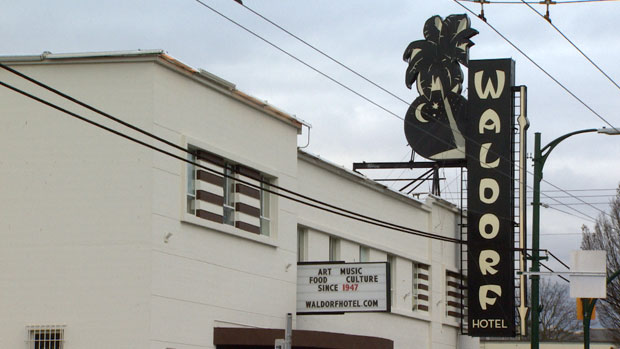Change the conversation, support rabble.ca today.
“At some point we need to stop replacing culture with condos,” tweeted Jian Ghomeshi yesterday in a “lament for the loss of the Waldorf hotel” to real estate developer Solterra. While many have pointed out that the property is not currently zoned for residential use, Ghomeshi neatly summarizes the tenor of Vancouverites who sympathize with the self-styled cultural mecca, to the point of launching at least one petition targeting the developer.
I won’t speak to the fact that a commercial venture which houses a local upscale chain restaurant whose other locations include Gastown and Kitsilano and a Tiki Bar can scarcely complain about gentrification — “The irony that the Waldorf was taken over by a condo developer in the very area we helped reinvigorate is obvious to anyone,” protests (former) Waldorf operator Thomas Anselmi — besides, our allies at the Mainlander already wrote that excellent article. But what is interesting is the way this story has mobilized Vancouver residents who identify with arts and culture.
It’s been a difficult month for artists and media professionals. Not only have they lost the Waldorf, but in December, they saw the city evict them from their offices in the Woodwards Building. While we can surely criticize Mayor Gregor Robertson — who, incredibly, attended a creative brunch at W2 the day his staff were changing the locks — and Vision’s hypocritical approach to building Vancouver’s creative community, some displaced residents of the Downtown Eastside may allow themselves a quiet moment of schadenfreude at anyone who partnered with this monument to gentrification and now finds themselves evicted. (Full disclosure: rabble.ca is a participating member of the W2 Community Media Arts Society and lost its Vancouver office space in the move.)
Perhaps some of the shock comes from Vision Vancouver’s stated goal to mobilize and capitalize on our city’s “creative class”: a market-oriented approach which incorporates progressive values like social diversity and lionizing the arts with libertarian economics. Vancouver’s cultural community is realizing to their horror that in such a partnership — especially in a city on a binge-drinking development bender — capital always has the last word.
It’s no secret that artists have traditionally been used as the shock troops of gentrification. Drawn to cheap rents and urban margins, creatives worldwide move into low-income or industrial neighbourhoods and, although their relationships with the existing community is typically positive and co-operative, they inevitably make these neighbourhoods more attractive to a more affluent class eager to appropriate the image of the artist: mosaic-lined bistros, loft apartments and exposed-brick galleries. Rents escalate, artists and residents are forced out, and the community identity is commodified and sold. Overalls to yoga pants in one easy step.
While artists have little say in how their communal aesthetic is exploited by the interests of capital, how they respond to that appropriation is critical. When the city of Berlin embarked upon the aufwertung mega-project Mediaspree in the early 2000s, artists and activists in the nearby neighbourhood of Freidrichshain resisted fiercely. Mediaspree versenken (“Sink the Mediaspree”) earned a referendum in 2008 against the project, which sought to invite investment from new media corporations to privatize, commercialize and “concretize” the Spree riverfront. Residents responded by voting a stunning 87% to keep the shores of the Spree free for all.
The referendum did not completely halt investment and the struggle is ongoing, but the result was a clear victory. Notably, the artists in the Mediaspree versenken collective did not attempt to compromise with corporations to secure a small amount of greenspace in return for a privatized riverfront: they simply said no (amongst other, less charitable language). Many Vancouver artists have taken this firm approach for decades. We might think the majority of Vancouverites would follow suit — that they had learned their lesson after Woodwards, the Olympic Village, the Playhouse and now the Waldorf: there is no compromising with capital.
Yet, even now, perhaps moved by Mayor Robertson’s tearful tweet, the most popular response to the Waldorf sale appears to ensure that as a condition of residential rezoning (for the parking lot behind the hotel or a gutting of the building itself), Solterra must keep the Waldorf intact (with different operators, presumably). Just leave us this much, please. The rest is yours.
It won’t work. Here: the arts aren’t profitable. Culture is not a business model. If capital sets the rules you’ll always lose. The only models that succeed include Bob Rennie’s private art gallery which serves as an advertisement for his real estate properties and a salve for the yearning of rich people who fancy themselves art connoisseurs. What Vancouver is discovering as the Waldorf sheds its sheep’s clothing, is not that our civic culture is under grave threat, but that it’s been hollowed out for years.
If we agree with Jian Ghomeshi that at some point — and we may be way past tipping — we need to choose culture over condos, that doesn’t mean collaborating with developers for the price of a Tiki bar. It means declaring as artists and residents that the positive vision of this city collectively produced is not for sale and won’t be. It means realizing that the parasitic real estate expansion carving out Vancouver’s artistic commonwealth in the interests of profit won’t be stopped until we stop it. Save the Waldorf, sure. But there’s far more here that needs saving. Our city depends on it.



